Unit 1 Great Scientists Grammar 课件(共39张PPT)
文档属性
| 名称 | Unit 1 Great Scientists Grammar 课件(共39张PPT) |
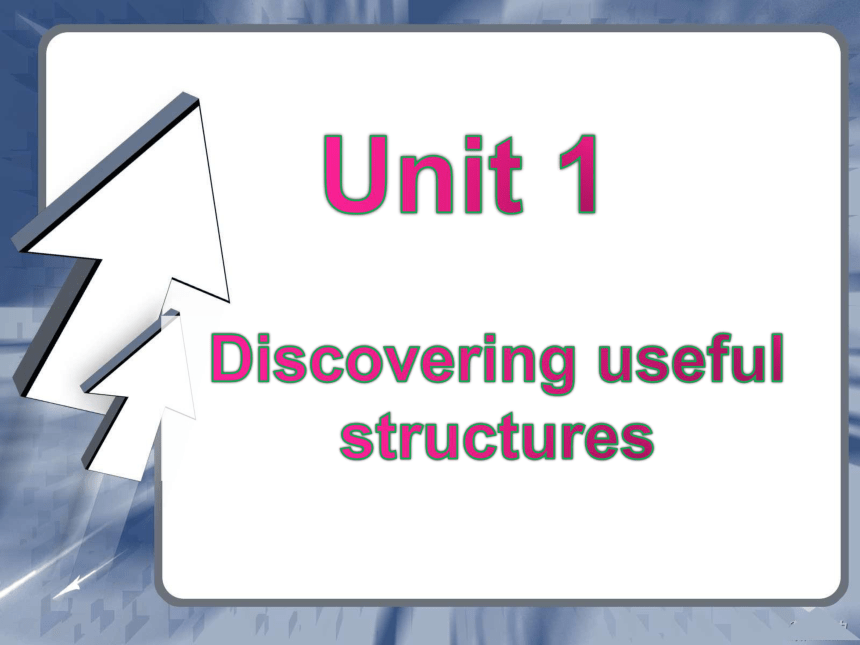
|
|
| 格式 | zip | ||
| 文件大小 | 1.1MB | ||
| 资源类型 | 教案 | ||
| 版本资源 | 人教版(新课程标准) | ||
| 科目 | 英语 | ||
| 更新时间 | 2019-11-16 00:00:00 | ||
图片预览

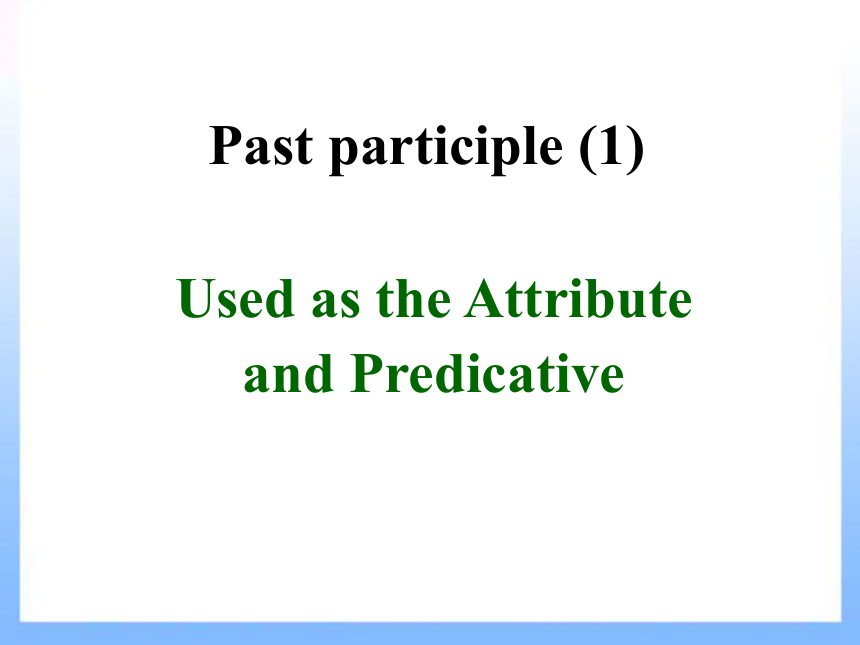

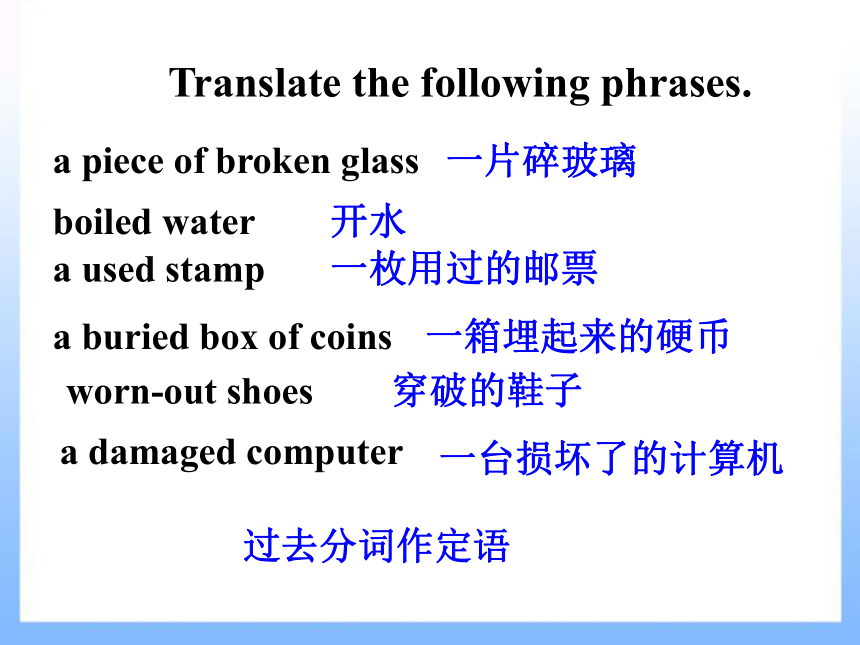
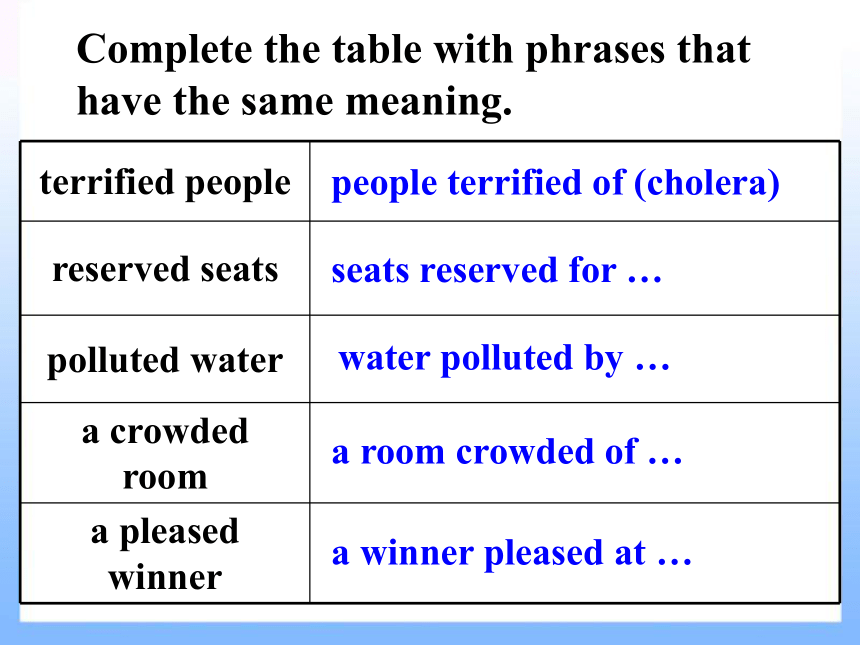
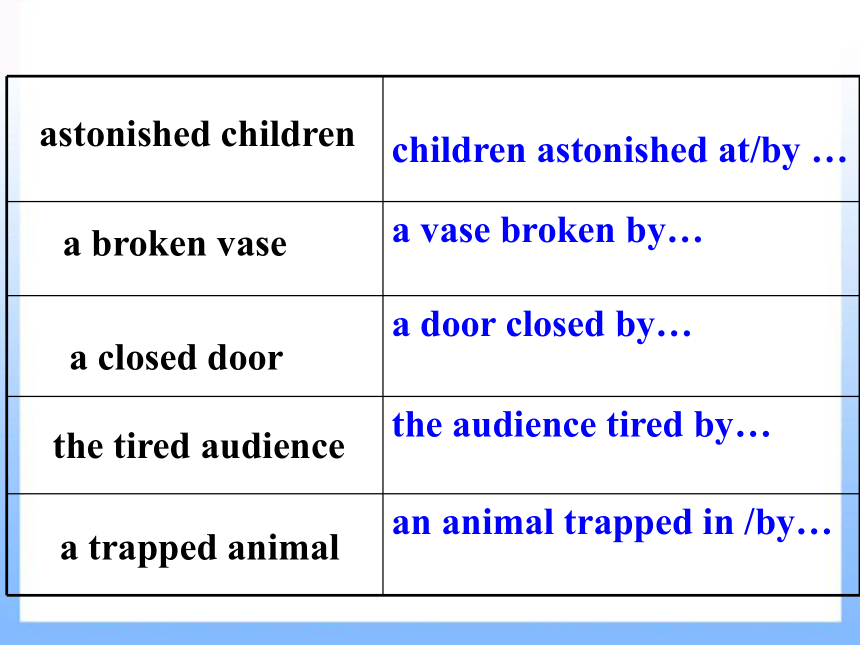
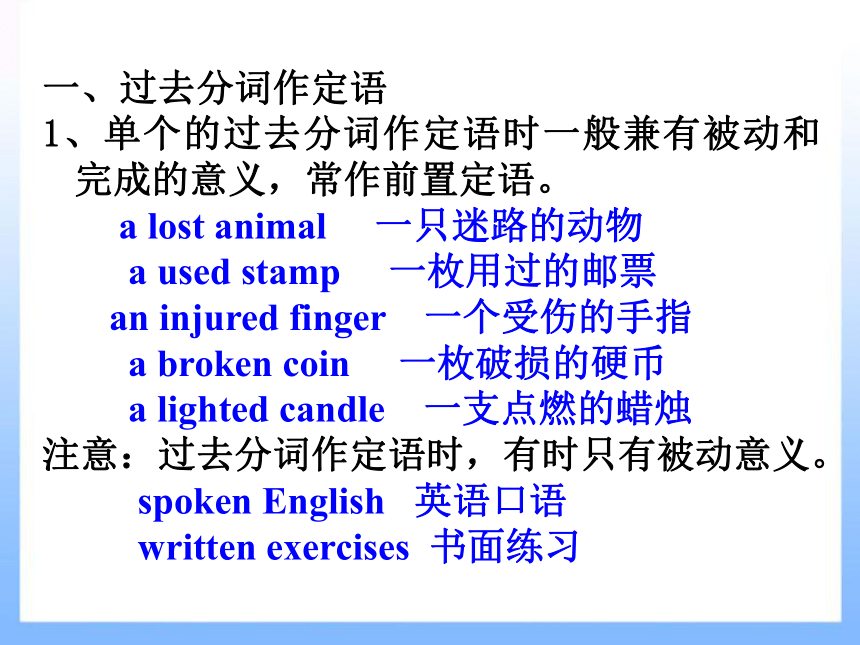
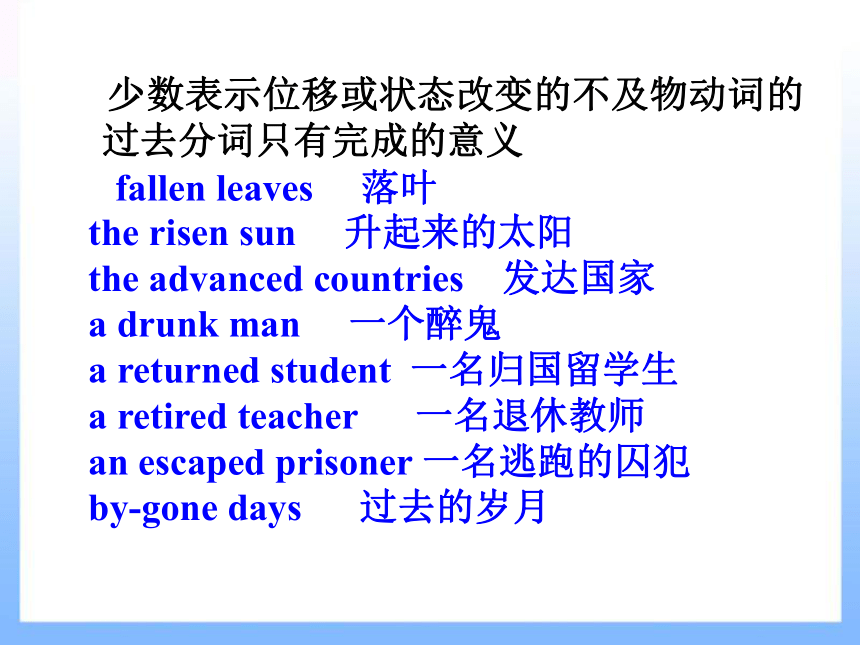
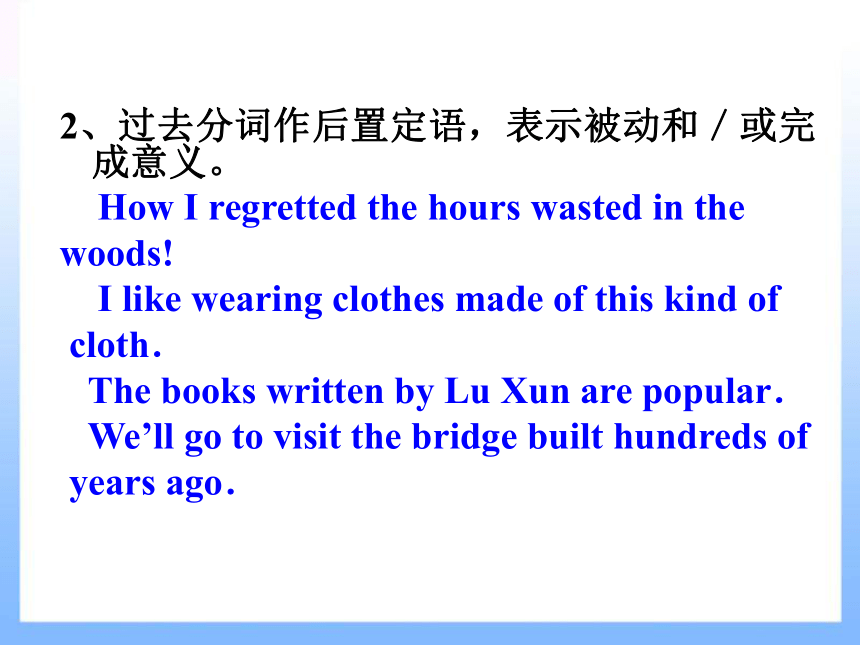
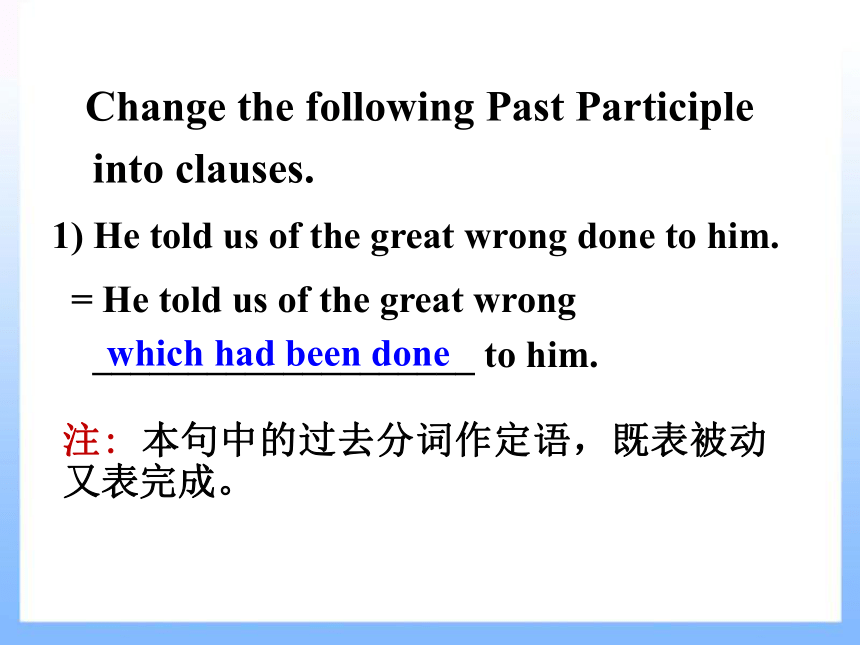

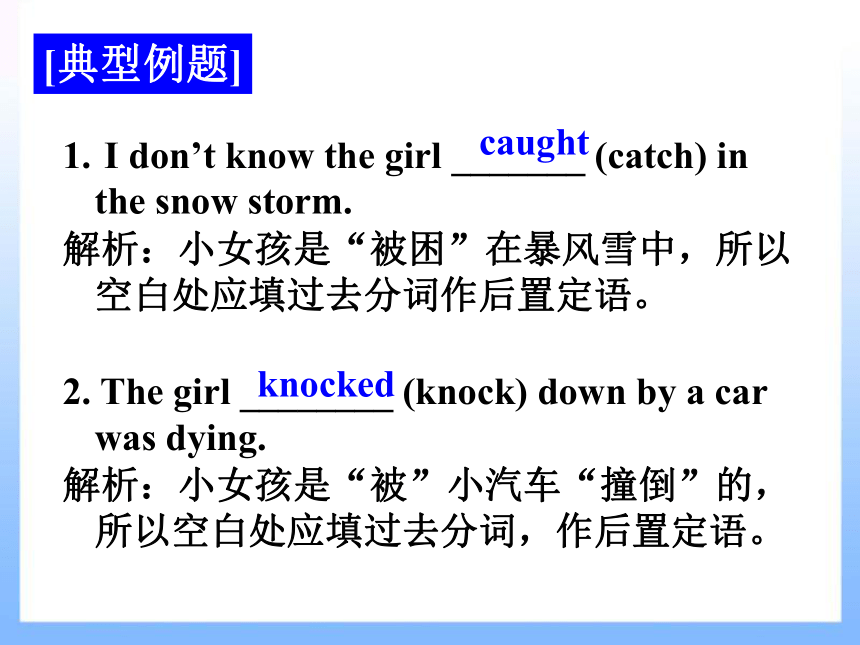
文档简介
(共39张PPT)
Used as the Attribute and Predicative
Past participle (1)
1. So many thousands of terrified people died.
2. He found that it came from the river polluted
by the dirty water from London.
3. But he became inspired when he thought about helping ordinary people.
attribute
attribute
predicative
What is the past participle used for?
a piece of broken glass
boiled water
a used stamp
a buried box of coins
a damaged computer
worn-out shoes
一片碎玻璃
开水
一枚用过的邮票
一箱埋起来的硬币
穿破的鞋子
一台损坏了的计算机
过去分词作定语
Translate the following phrases.
Complete the table with phrases that have the same meaning.
people terrified of (cholera)
seats reserved for …
water polluted by …
a room crowded of …
a winner pleased at …
terrified people
reserved seats
polluted water
a crowded room
a pleased winner
astonished children
a closed door
the tired audience
a trapped animal
a broken vase
children astonished at/by …
a vase broken by…
a door closed by…
the audience tired by…
an animal trapped in /by…
一、过去分词作定语
1、单个的过去分词作定语时一般兼有被动和完成的意义,常作前置定语。
a lost animal 一只迷路的动物
a used stamp 一枚用过的邮票
an injured finger 一个受伤的手指
a broken coin 一枚破损的硬币
a lighted candle 一支点燃的蜡烛
注意:过去分词作定语时,有时只有被动意义。
spoken English 英语口语
written exercises 书面练习
少数表示位移或状态改变的不及物动词的过去分词只有完成的意义
fallen leaves 落叶
the risen sun 升起来的太阳
the advanced countries 发达国家
a drunk man 一个醉鬼
a returned student 一名归国留学生
a retired teacher 一名退休教师
an escaped prisoner 一名逃跑的囚犯
by-gone days 过去的岁月
2、过去分词作后置定语,表示被动和/或完成意义。
How I regretted the hours wasted in the
woods!
I like wearing clothes made of this kind of
cloth.
The books written by Lu Xun are popular.
We’ll go to visit the bridge built hundreds of
years ago.
Change the following Past Participle into clauses.
1) He told us of the great wrong done to him.
= He told us of the great wrong ____________________ to him.
which had been done
注: 本句中的过去分词作定语,既表被动又表完成。
2)The United States is a developed country.
= The United Stated is a country ______________________ .
which has developed
注: 本句中的过去分词作定语,只表示完成。
3)Have you noticed the bridge being built there?
= Have you noticed the bridge ______________ there?
which is being built
注:本句中的过去分词作定语,表示被动的动作正在进行。
I don’t know the girl _______ (catch) in the snow storm.
解析:小女孩是“被困”在暴风雪中,所以空白处应填过去分词作后置定语。
2. The girl ________ (knock) down by a car was dying.
解析:小女孩是“被”小汽车“撞倒”的,所以空白处应填过去分词,作后置定语。
[典型例题]
caught
knocked
3. After completing and signing it, please return the form to us in the envelope _________ (provide).
解析: 动词provide与其逻辑主语envelop是被动关系,在句中作定语,相当于which is provided。
provided
4. “It’s such a nice place.” Mother said as she sat at the table _________ (reserve) for customers.
解析:reserve 和谓语动词sat 之间没有连词,且和其逻辑主语the table 逻辑上构成被动关系,故用过去分词表示被动、完成的概念,在句子中做后置定语。
reserved
5. Amie Salmon, disabled, is attended throughout her school days by a nurse ________ (appoint) to guard her.
6. The producer comes regularly to collect the cameras _________ (return) to our shop for quality problems.
7. The players _________ (select) from the whole country are expected to bring us honor in this summer game.
appointed
returned
selected
8. Tsinghua University, ________ (found) in 1911, is home to a great number of outstanding figures.
解析:句中的主语Tsinghua University与found构成逻辑上的被动关系;再根据时间1911年可知found动作已经完成,故用过去分词。
founded
9. So far nobody has claimed the money __________ (discover) in the library.
解析:该空在句中作后置定语,修饰the money,根据the money与discover的被动关系,可判断填discovered。
discovered
10. A great number of students _________ (question) said they were forced to practise the piano.
解析:question与students 存在被动关系,question表示的动作也已完成,故用过去分词。
questioned
11. Mrs. White showed her students some old maps _________ (borrow) from the library.
解析:根据选项此题考察非谓语动词,题干中空格划在名词maps后,空格后部分是对maps解释说明,因此此题考察非谓语动词做定语。根据句意,borrow的动作已经完成,因此填borrowed。
borrowed
12. The island, _______ (join) to the mainland by a bridge, is easy to go to.
解析:join … to …表示“把……连接起来”,joined在句中是过去分词作定语,相当于定语从句which is joined …。
joined
过去分词与现在分词作定语的区别
区别主要表现在语态和时间关系上
首先,在语态上不同:现在分词表示主动的意思,而过去分词多表示被动的意思。请比较:
surprising news 使人吃惊的消息
surprised listeners 吃惊的听众
值得注意的是,有一些过去分词由不及物动词变来,它们只表示一个动作已完成,没有被动的意味。例如:fallen leaves 落叶
其次,时间关系上不同:一般来说,现在分词表示的动作往往正在进行,而过去分词所表示的动作往往已经完成。请比较:
the changing world
正在发生变化的世界
the changed world
已经变化了的世界
1. There was a terrible noise ________ (follow) the sudden burst of light.
答案following。由于声音在闪电后,因此为声跟随着光,声音为跟随的发出者,为主动。用现在分词。
2. _________ (follow) by some officials, Napoleon inspected his army.
答案Followed。 Napoleon 与follow 之间有被动的含义。
following
Followed
Read the sentences, paying attention to the past participle.
The glass is broken. Our classroom is crowded. The ground is covered with snow.
I found that I was lost. Those days are gone. He is dead drunk.
二、过去分词作表语
1、过去分词作表语,表示主语的特点或所处的状态,其前的系动词有包括be在内的多种形式。
Everyone present is very inspired at his
speech.
听了他的发言,在场的所有人都很振奋。
You seem frightened.
你似乎受了惊吓。
2、过去分词作表语,构成的系表结构与被动语态的区别:
过去分词作表语,强调主语的特点或所处的状态;而被动语态中,主语是动词所表示动作的承受者。
This shop is now closed.
这家商店现在已经关门了。(状态)
This shop is closed at 6 p.m. every day.
这家商店每天6点关门。(动作)
3、 现在分词作表语,表示的动作与句子的
主语构成逻辑上的主谓关系;而过去分词
作表语,其动作与句子的主语构成逻辑上
的动宾关系。如:
The news was exciting and we were all excited.
= The news was exciting and it excited us all.
We were surprised at what he said at the meeting.
= What he said at the meeting surprised us.
In April, thousands of holidaymakers
remained ________ (stick) abroad due to the volcanic ash cloud.
2. ________ in the poorest area of Glasgow, he had a long, hard road to becoming a football star.
[典型例题]
stuck
Raised
3. ________ (absorb) in painting, John didn’t notice evening approaching.
4. As we joined the big crowd I got _________ (separate) from my friends.
Absorbed
separated
一、用括号内动词的适当形式填空。
The concert _______ (hold) at the Beijing Workers’ Stadium was a big success.
2. Walking out of the office with a ________ (force) smile on her face, she turned to say goodbye to her teacher.
held
forced
3. He asked his students to remain ________ (seat)?until all the papers had been handed in.
4. There was nothing ________ (leave) in the fridge, so he had to go out for dinner.
5. The students were all _________ (inspire) when they heard the _________ (inspire) news.
seated
left
inspired
inspiring
6. When he got back, he found that his ?bread had gotten ________ (burn).
7. The police said on Thursday that they had a _________ (suspect) person of the murder, which could be a great help to them.
burnt
suspected
8. Fortunately, the __________ (infect) people were sent to hospital immediately.
9. The primary purpose is to make ?achievements in biological research _________ (know) to the public.
infected
known
10. John told me that the __________ (excite) plan was the one put forward by Mr. Zhang at yesterday’s meeting.
11. The museum once ________ (build) for exhibiting famous cars has been pulled down.
exciting
built
二、翻译题。
1. 丢了钱他自责不已。
He ______________ about losing the money.
2. 你为什么总是看上很疲劳?这些日子睡得好吗?
Why do you always _______________ ? Do you sleep well these days?
got blamed
look so tired
3. 我对昨晚看的电影很失望,我原以为它能好些。
I ________________________the film I saw last night, I had expected it to be better.
4. 听说那位明星死了,人人都很震惊。
Everybody ____________to hear the death of the famous film star.
was disappointed with
was shocked
5. 要去动物园了,孩子们非常兴奋。
The children________________________
going to the zoo.
6. 他的伤口感染了一种新病毒.
His wound _____________________ a new virus.
are really excited about
became infected with
Complete the sentences using the past
participle as the predicative.
1. He got _______ about losing the money.
2. Why do you always look so______ after working for a whole day?
3. I was _____________ with the film I saw last night. I had expected it to be better.
worried
tired
disappointed
4. Everybody was __________________ to hear of the death of the famous film star.
5. Everybody is really _______ about the new Olympic stadiums.
6. His wound became ________ with a new virus.
shocked/ depressed
excited
infected
Used as the Attribute and Predicative
Past participle (1)
1. So many thousands of terrified people died.
2. He found that it came from the river polluted
by the dirty water from London.
3. But he became inspired when he thought about helping ordinary people.
attribute
attribute
predicative
What is the past participle used for?
a piece of broken glass
boiled water
a used stamp
a buried box of coins
a damaged computer
worn-out shoes
一片碎玻璃
开水
一枚用过的邮票
一箱埋起来的硬币
穿破的鞋子
一台损坏了的计算机
过去分词作定语
Translate the following phrases.
Complete the table with phrases that have the same meaning.
people terrified of (cholera)
seats reserved for …
water polluted by …
a room crowded of …
a winner pleased at …
terrified people
reserved seats
polluted water
a crowded room
a pleased winner
astonished children
a closed door
the tired audience
a trapped animal
a broken vase
children astonished at/by …
a vase broken by…
a door closed by…
the audience tired by…
an animal trapped in /by…
一、过去分词作定语
1、单个的过去分词作定语时一般兼有被动和完成的意义,常作前置定语。
a lost animal 一只迷路的动物
a used stamp 一枚用过的邮票
an injured finger 一个受伤的手指
a broken coin 一枚破损的硬币
a lighted candle 一支点燃的蜡烛
注意:过去分词作定语时,有时只有被动意义。
spoken English 英语口语
written exercises 书面练习
少数表示位移或状态改变的不及物动词的过去分词只有完成的意义
fallen leaves 落叶
the risen sun 升起来的太阳
the advanced countries 发达国家
a drunk man 一个醉鬼
a returned student 一名归国留学生
a retired teacher 一名退休教师
an escaped prisoner 一名逃跑的囚犯
by-gone days 过去的岁月
2、过去分词作后置定语,表示被动和/或完成意义。
How I regretted the hours wasted in the
woods!
I like wearing clothes made of this kind of
cloth.
The books written by Lu Xun are popular.
We’ll go to visit the bridge built hundreds of
years ago.
Change the following Past Participle into clauses.
1) He told us of the great wrong done to him.
= He told us of the great wrong ____________________ to him.
which had been done
注: 本句中的过去分词作定语,既表被动又表完成。
2)The United States is a developed country.
= The United Stated is a country ______________________ .
which has developed
注: 本句中的过去分词作定语,只表示完成。
3)Have you noticed the bridge being built there?
= Have you noticed the bridge ______________ there?
which is being built
注:本句中的过去分词作定语,表示被动的动作正在进行。
I don’t know the girl _______ (catch) in the snow storm.
解析:小女孩是“被困”在暴风雪中,所以空白处应填过去分词作后置定语。
2. The girl ________ (knock) down by a car was dying.
解析:小女孩是“被”小汽车“撞倒”的,所以空白处应填过去分词,作后置定语。
[典型例题]
caught
knocked
3. After completing and signing it, please return the form to us in the envelope _________ (provide).
解析: 动词provide与其逻辑主语envelop是被动关系,在句中作定语,相当于which is provided。
provided
4. “It’s such a nice place.” Mother said as she sat at the table _________ (reserve) for customers.
解析:reserve 和谓语动词sat 之间没有连词,且和其逻辑主语the table 逻辑上构成被动关系,故用过去分词表示被动、完成的概念,在句子中做后置定语。
reserved
5. Amie Salmon, disabled, is attended throughout her school days by a nurse ________ (appoint) to guard her.
6. The producer comes regularly to collect the cameras _________ (return) to our shop for quality problems.
7. The players _________ (select) from the whole country are expected to bring us honor in this summer game.
appointed
returned
selected
8. Tsinghua University, ________ (found) in 1911, is home to a great number of outstanding figures.
解析:句中的主语Tsinghua University与found构成逻辑上的被动关系;再根据时间1911年可知found动作已经完成,故用过去分词。
founded
9. So far nobody has claimed the money __________ (discover) in the library.
解析:该空在句中作后置定语,修饰the money,根据the money与discover的被动关系,可判断填discovered。
discovered
10. A great number of students _________ (question) said they were forced to practise the piano.
解析:question与students 存在被动关系,question表示的动作也已完成,故用过去分词。
questioned
11. Mrs. White showed her students some old maps _________ (borrow) from the library.
解析:根据选项此题考察非谓语动词,题干中空格划在名词maps后,空格后部分是对maps解释说明,因此此题考察非谓语动词做定语。根据句意,borrow的动作已经完成,因此填borrowed。
borrowed
12. The island, _______ (join) to the mainland by a bridge, is easy to go to.
解析:join … to …表示“把……连接起来”,joined在句中是过去分词作定语,相当于定语从句which is joined …。
joined
过去分词与现在分词作定语的区别
区别主要表现在语态和时间关系上
首先,在语态上不同:现在分词表示主动的意思,而过去分词多表示被动的意思。请比较:
surprising news 使人吃惊的消息
surprised listeners 吃惊的听众
值得注意的是,有一些过去分词由不及物动词变来,它们只表示一个动作已完成,没有被动的意味。例如:fallen leaves 落叶
其次,时间关系上不同:一般来说,现在分词表示的动作往往正在进行,而过去分词所表示的动作往往已经完成。请比较:
the changing world
正在发生变化的世界
the changed world
已经变化了的世界
1. There was a terrible noise ________ (follow) the sudden burst of light.
答案following。由于声音在闪电后,因此为声跟随着光,声音为跟随的发出者,为主动。用现在分词。
2. _________ (follow) by some officials, Napoleon inspected his army.
答案Followed。 Napoleon 与follow 之间有被动的含义。
following
Followed
Read the sentences, paying attention to the past participle.
The glass is broken. Our classroom is crowded. The ground is covered with snow.
I found that I was lost. Those days are gone. He is dead drunk.
二、过去分词作表语
1、过去分词作表语,表示主语的特点或所处的状态,其前的系动词有包括be在内的多种形式。
Everyone present is very inspired at his
speech.
听了他的发言,在场的所有人都很振奋。
You seem frightened.
你似乎受了惊吓。
2、过去分词作表语,构成的系表结构与被动语态的区别:
过去分词作表语,强调主语的特点或所处的状态;而被动语态中,主语是动词所表示动作的承受者。
This shop is now closed.
这家商店现在已经关门了。(状态)
This shop is closed at 6 p.m. every day.
这家商店每天6点关门。(动作)
3、 现在分词作表语,表示的动作与句子的
主语构成逻辑上的主谓关系;而过去分词
作表语,其动作与句子的主语构成逻辑上
的动宾关系。如:
The news was exciting and we were all excited.
= The news was exciting and it excited us all.
We were surprised at what he said at the meeting.
= What he said at the meeting surprised us.
In April, thousands of holidaymakers
remained ________ (stick) abroad due to the volcanic ash cloud.
2. ________ in the poorest area of Glasgow, he had a long, hard road to becoming a football star.
[典型例题]
stuck
Raised
3. ________ (absorb) in painting, John didn’t notice evening approaching.
4. As we joined the big crowd I got _________ (separate) from my friends.
Absorbed
separated
一、用括号内动词的适当形式填空。
The concert _______ (hold) at the Beijing Workers’ Stadium was a big success.
2. Walking out of the office with a ________ (force) smile on her face, she turned to say goodbye to her teacher.
held
forced
3. He asked his students to remain ________ (seat)?until all the papers had been handed in.
4. There was nothing ________ (leave) in the fridge, so he had to go out for dinner.
5. The students were all _________ (inspire) when they heard the _________ (inspire) news.
seated
left
inspired
inspiring
6. When he got back, he found that his ?bread had gotten ________ (burn).
7. The police said on Thursday that they had a _________ (suspect) person of the murder, which could be a great help to them.
burnt
suspected
8. Fortunately, the __________ (infect) people were sent to hospital immediately.
9. The primary purpose is to make ?achievements in biological research _________ (know) to the public.
infected
known
10. John told me that the __________ (excite) plan was the one put forward by Mr. Zhang at yesterday’s meeting.
11. The museum once ________ (build) for exhibiting famous cars has been pulled down.
exciting
built
二、翻译题。
1. 丢了钱他自责不已。
He ______________ about losing the money.
2. 你为什么总是看上很疲劳?这些日子睡得好吗?
Why do you always _______________ ? Do you sleep well these days?
got blamed
look so tired
3. 我对昨晚看的电影很失望,我原以为它能好些。
I ________________________the film I saw last night, I had expected it to be better.
4. 听说那位明星死了,人人都很震惊。
Everybody ____________to hear the death of the famous film star.
was disappointed with
was shocked
5. 要去动物园了,孩子们非常兴奋。
The children________________________
going to the zoo.
6. 他的伤口感染了一种新病毒.
His wound _____________________ a new virus.
are really excited about
became infected with
Complete the sentences using the past
participle as the predicative.
1. He got _______ about losing the money.
2. Why do you always look so______ after working for a whole day?
3. I was _____________ with the film I saw last night. I had expected it to be better.
worried
tired
disappointed
4. Everybody was __________________ to hear of the death of the famous film star.
5. Everybody is really _______ about the new Olympic stadiums.
6. His wound became ________ with a new virus.
shocked/ depressed
excited
infected
